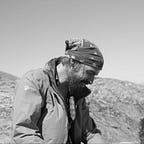Preservation, and the Lyric
first published in The Stillwater Review (2020)
*
the HEAD, by way of the EAR, to the SYLLABLE
the HEART, by way of the BREATH, to the LINE
-Charles Olson
It’s a kind of siren song. We are the sirens and we are the driven mad. And are drowned by it. Diving in finally to the comfort, the lure, the knowledge of our own reflections in the vast sea, which is to say, drowning in our knowns.
-Ross Gay
messenger of spring
nightingale with a voice of longing
It was spell, charm, incantation. It was alchemy and enchantment, an exorcism. It was duende. Some heard fragments only in deep woods on dark nights. Others caught a whispering in the trees, the trees big and thick with canopy and shadow. It was the first thought — felled wonder, fear, yearning — all at once. The sound more cry than song though it felt purposeful and so we called it music. (Sappho wrote of it.) And there were others. Through time and space the muse returned, they were visitations. The song a place deep in the soul’s ache, and so it was there before the name for it. We consider memory, tell stories. Most of the time we do not even know why.
I would not think to touch the sky with two arms
River’s low, herons. Breeze and acorns dropping to water. She called it murderbird. In the middle of the field, in the wide open sky — there, then gone. Raptor slipping to wilderness, in mind. The wilderness of the mind. Where one does less violence to the earth, harm more idea than action. But language too is a tricky thing. Some would say words damage, damn — perhaps enough to consider. But music comes supreme. A path through trees, fallen leaves, no conclusion, judgment forgotten. The sound lingers in memory or beauty. We attach it to a feeling and therefore can only destroy ourselves. But why would we do such a thing?
]thought
]barefoot
Somewhere here. Begins with the mind, ends in earth. Moves from dirt through body into being — first lost, journeyed. How the music lingers like fragments of bone stored in rock, clay, the Awash river valley. Jean, you say Lucy can still hear. How there are voices around us if we listen. None alone, none without story — more myth than knowing. It begins in grass, barefoot — the touch of knowns. How the wind moves through the trees. From it a lingering song deep in the chest returns and returns again and again to ache, for it cannot be explained. It is okay to feel afraid she told me, and I loved her.
O beautiful O graceful one
Keep me in your graces. Show me beauty, please. The presence to find it. I promise not for a moment to lift my small voice against it. No hand will be raised, no head turned. There will be no judgment or criticism, no sensation will become a thought. I will stay here until there is calm. I will stay in stillness until that softness settles in. I will stay for love. For there is something I wanted to hear: a lyric, and I say it is beautiful. And fleeting. Without beauty, what then of truth? Without truth, what recognition: solo native, exile, forgotten?
yes! radiant lyre speak to me
become a voice
There is a wisdom in that which we cannot explain. Why fear wisdom? It returns us to source — both river and current, water, life. And there is music in it. (Always music.) Do you not hear? She is both muse and lover. You are both muse and lover. They — muse, lover. It is what’s shared: the song of longing and love. It carries me from forest through trees, by river to the sea. With each return the little birds and their faint calls, the ferns. Only in silence does one hear the music. The music alive, the forest alive, my lone self a traveler — willing and alive.
as long as you want
I will wait by the river. I will listen to its song. And from it, if a poem comes it will be so. A poem is wont to travel. It will move too. Gives rain to the trees, small calls in the woods. I carry it wherever I go. When I feel lonely, I sing. Sing of big trees, old trees, trees that turn rusty gold, and trees forever green. You are there with me, always with me. The voice I hold close, the song that brings me to you. The song will bring me to you.
*
Italicized lines Sappho fragments from If Not, Winter (translated by Anne Carson, 2002). Epigraphs from Charles Olson’s “Projective Verse” (1950), Ross Gay in lecture at Drew University (January 7, 2009)
The Stillwater Review published by Betty June Silconas Poetry Center at Sussex County College.
